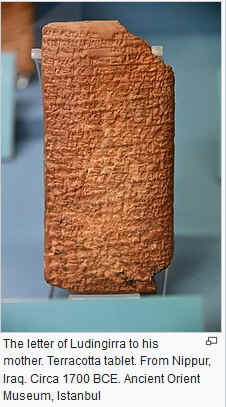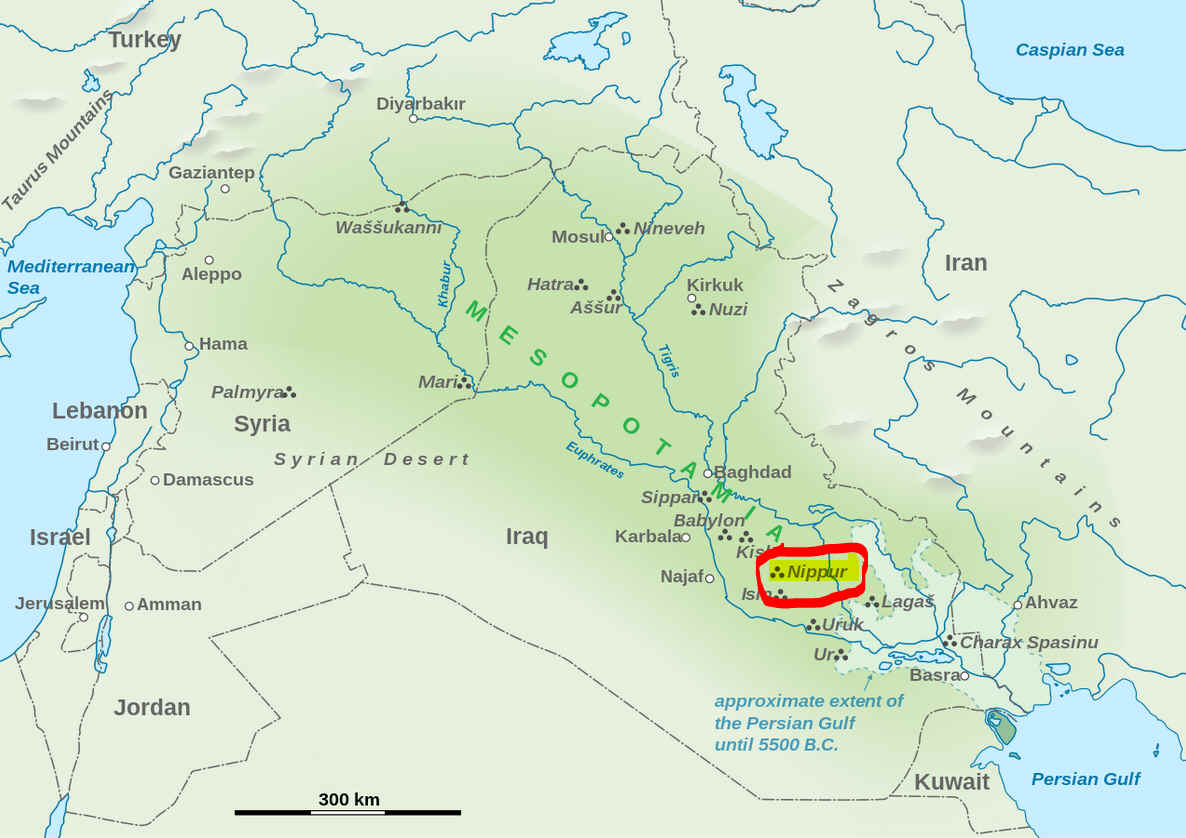

Luddigira’s
Message to His Mother:
This
poem was written by a Sumerian nobleman from Nippur to his mother on a tablet.
His name is Luddigira. He wrote this poem to say hi and to lighten her heart
while he was travelling. It was
written circa 1700 BCE, so approximately 3,700 years old.
It
was translated from Sumerian to Turkish by one of the most prominent Sumerologs
in the world, Prof. Muazzez Ilmiye Çığ. She is currently 107 years
old, retired a few years ago. My aunt Selma Emler knew both her and her husband
well, as they worked at the Topkapi Palace Museum, in the same building. They
were of Crimean Turkish descent; therefore, my father knew them too. Wait, there
is more: their son Murat was my classmate in my boarding school in Istanbul
during my middle/high school years, 1962-1969.
You
might find other English translations of this letter here and there, but I did
not find one as passionate as I thought it should be. So, I translated it from
Turkish into English (loosely) with an emphasis to convey the emotions as
accurately as I could.
My
guess is that Luddigira was travelling a few weeks after the first barley sowing
festival (Akitum), sometime in early May. Which makes it perfect for current day
Mother’s Day. I only wish I had the opportunity to tell these beautiful words
to my mom while she was alive. She would be so happy. The translation process
was a joyful tearjerker for me, I hope you enjoy it too.
To
My Dear Mother
By
Luddigira,
Royal
courier, now start your journey!
I
want to send you to Nippur -- deliver this message!
I
had a long journey.
My
mother is in sorrow, she cannot sleep
Although
her room is blocked to all worrisome gossip,
She
keeps asking all travellers how I am doing,
Deliver
my letter of greeting into her hands,
If
you don’t know my mother, let me describe her to you:
Her
name is Sha-Tishtar
With
a brilliantly shining appearance
She
has the pleasantness of a Goddess, a sweet bride
She
has been respected since the days of her youth.
She
keeps the order in the house of her father-in-law.
She
serves humbly her husband’s God.
She
knows how to look after Goddess Inana's place.
She
never disregards king’s wishes.
She
is loved, and she is full of love.
Like
a lamb, sweet butter, honey, flowing ghee from her heart, she is.
Let
me give you a second description of my mother:
My
mother is like the bright light on the horizon, a doe
on the hills.
She
is the bright shining morning star,
She
is precious carnelian, a topaz from Marhashi.
She
is the most attractive preciousness of a king's brother, full of beauty.
She
is a carnelian source of joy
She
is a bracelet of tin, a ring of iron,
She
is a chisel of gold and a shining silver,
A
breathing (sighing) ivory statuette,
She
is an alabaster angel standing on a pedestal of lapis lazuli.
Let
me give you a third description of my mother:
My
mother is rain from heaven, the first water for seeds
A
rich garden full of fruits
A
beautiful fir tree adorned with many cones
The
crop in the first month of the new year.
She
is an irrigation canal bringing fertility to farmed lands.
She
is a sweet Dilmun date, the sweetest date much sought
after.
Let
me give you a fourth description of my mother:
My
mother is full of joy and offerings in akitum* festival,
She
is what princesses are made of, a song of abundance.
She
has endless joy, her heart loving and loved
She
is the glad tidings for a captive returning to his mother.
Let
me give you a fifth description of my mother:
She
is a chariot of pine wood, a palanquin made of boxwood
In
a beautiful dress, sprinkled with perfume,
A
garland on her head, fitting perfectly
These
descriptions I gave you, you’ll recognize my mother,
That
pleasant one that radiates her presence; she is my mother.
As
she silently (anxiously) waits for news from me,
Please
give her my message joyously
Tell
her “Greetings from your dear son Luddigira”
Source:
The Life Story of Ludingirra, Tablet 16, Translated to Turkish by Sumerolog
Prof. Muazzez Ilmiye Çığ. Translated to English by Cemil Otar in
2021.
*
Akitu or Akitum is a spring festival held in the first month of Nisanu (~ April)
in ancient Mesopotamia, to celebrate the sowing of barley. The Babylonian and
Assyrian Akitu festival has played a pivotal role in the development of theories
of religion, myth and ritual.
The
first description is her name and place in the community.
The
second description is her appearance and beauty,
The
third description is how useful and resourceful she is to the community.
The
fourth description is her attitude and demeanor in life.
And
finally, the fifth description is about how precious she is.
The Map of ancient Mesopotamia (Source: Wikipedia):
